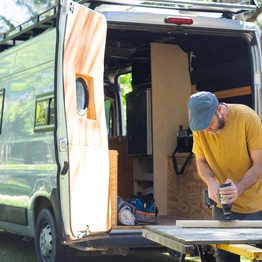Campervan in Conversion Insurance
If you’re modifying a campervan, either yourself or with the help of a professional, campervan in conversion insurance is there to protect you.

Why choose Howden for Campervan in Conversion Insurance?
Here at Howden, our team of experts pride themselves on doing the heavy lifting for our clients, so they don’t have to. We strive to make the process of comparing multiple policies, on your behalf, simple and easy, thanks to the great relationships we have with our selected panel of standard and specialist insurers.
We also provide a personalised service, focused on getting to know you and finding out exactly what you want from your campervan in conversion insurance, because our team knows that each policy needs to be as individual as its owner. As enthusiasts ourselves, we also understand how important your campervan is to your lifestyle, and want to help you keep it that way.
Ultimately though, just know, whether you need to purchase a new campervan policy, renew an existing one, or even need to make a claim, we’re always here to help.
Benefits of working with Howden:
- We’re driven to save you time, money, and hassle.
- Speak with your local branch, within your community.
- We’re right by your side in the event of a claim.
- Benefit from a tailored service that comparison sites can’t provide.
- You can trust us – we’re rated Excellent on Trustpilot.
When do you need campervan in conversion insurance?
Campervan in conversion insurance is a specialised type of coverage designed to protect your vehicle while you’re converting it from a standard van into a campervan. It covers the vehicle and conversion work while your original van is being modified, filling the gap between standard van insurance and full campervan insurance.
The type of insurance you need will evolve at different stages of the conversion process:
- Pre-conversion: As soon as you purchase the base vehicle, you'll need to have standard van insurance in place. As soon as you know that you plan to convert it (this might be from the outset), inform your insurer.
- During conversion: This is when in conversion insurance becomes crucial. It's a good idea to have in place as soon as you start modifying the vehicle, as these changes typically alter the vehicle’s classification and risk profile.
- Mid-conversion pauses: If there are periods when the conversion is paused, you may need other types of insurance, such as laid-up insurance, to cover your partially converted vehicle while you’re not using it. Note that you can’t drive your car on public roads when you have laid-up insurance in place.
- Post-conversion: Once the conversion is complete, you'll need to switch to full campervan insurance.
It's important to note that regular van insurance usually becomes invalid as soon as you start modifying your vehicle. As a result, you need to arrange the right type of insurance coverage before you start any conversion work. While campervan in conversion insurance isn’t mandatory, it’s highly recommended as you need to have at least third-party insurance in place for any vehicle used on public roads.
What does campervan in conversion insurance include?
Self-build campervan insurance typically includes protection for the following:
- The base vehicle: Protects the original van and its mechanics.
- Partially completed modifications: Covers modifications and installations as they’re added.
- Materials and tools: Insures supplies and equipment used in the conversion.
- Public liability: Protects against claims if someone is injured as a result of your conversion work.
- Fire and theft protection: Covers loss or damage from these risks during conversion.
- Laid-up cover: Protects the vehicle when it's off-road during conversion.
- Personal accident cover: Protects you in case you sustain any injuries while working on the van.
- Legal expenses: Covers the costs of legal action related to the conversion.
- Breakdown assistance: Helps in case you break down, which can be useful if you’re testing your partially completed van.
- Flexible valuation: Allows for increasing coverage as the value of your van rises with the modifications.
Not all of these forms of coverage are included in every insurance policy. Make sure you check your policy details with your insurer. If there’s anything you don’t need, see if it can be removed in an effort to lower your premiums. And if there’s something extra you do need, ask whether it can be included as an add-on.
How to insure a van while converting it
It’s not difficult to insure your campervan while you’re converting it. Here are the steps you should follow:
- Inform your insurer: It’s always a good idea to be as open and honest with your insurer as you can. Let them know about your plans to convert your van as soon as your ideas start falling into place, and keep them posted along the way.
- Seek specialist insurers: If your current insurer doesn’t provide converted campervan insurance, look for companies that do. There are specialist insurers who will be able to help you.
- Provide detailed information: Be prepared to share information on your base vehicle, your planned modifications, how long you estimate your conversion to take, whether you’re doing it yourself or seeking professional help, and, if it’s a DIY job, your level of experience.
- Choose the appropriate level of coverage: Select a policy that includes the criteria that’s most important to you. Public liability insurance might be important if you have any friends or family helping you, and there’s a risk of personal injury. Coverage for your tools and materials may be a priority if you’ve purchased equipment that would be expensive to replace.
- Update your insurer regularly: Keep your insurer informed of any significant changes or milestones during the conversion process.
- Document everything: Keep receipts, photos, and records of all the work you’ve done to support potential claims and the final valuation.
Remember, that requirements and premiums can vary between insurers, so it's worth comparing multiple quotes.
How much is campervan conversion insurance?
The cost of campervan conversion insurance varies based on several factors, including:
- Your base vehicle value and type
- The estimated value of your conversion work
- Your experience in conversions
- Where you’re storing your van while you convert it
- Your driving history
- The level of coverage you’ve chosen
It’s possible that your insurance costs will increase as the conversion progresses and the vehicle's value increases, and DIY conversions might have higher premiums due to the perceived risk. Short-term policies for quick conversions may have different pricing structures, which may help you save.
Do you have to tell the DVLA if you convert a van to a camper?
Yes, you should inform the DVLA when you convert a van to a campervan (the DVLA refers to this as a motor caravan). This is because the vehicle needs to be reclassified, since the vehicle is no longer a standard van, it’s another type of vehicle entirely.
In your application, the DVLA will expect to see the following external features:
- Two or more windows on at least one side of the main body (this does not include windows on the driver or passenger doors) to provide a reasonable amount of daylight into the living accommodation
- A separate door which provides access to the living accommodation of the vehicle (this excludes the driver and passenger doors); a window on this door counts as a separate window on the main body
- Motor caravan-style graphics on both sides of the vehicle
- An awning bar attached to either side of the vehicle
- A high-top roof (this does not include a pop-top elevating roof)
And the following internal features:
- Seats and a table
- Sleeping accommodation which may be converted from the seats
- Cooking facilities
- Storage facilities
If your vehicle’s current body type falls into one of these categories, and meets the criteria above, the DVLA will consider changing the body type to motor caravan in your V5C log book. You should inform DVLA once the conversion is complete and meets their criteria.
What kind of insurance do I need for a campervan?
Once your conversion is complete, you will need to take out specialist campervan insurance for your brand-new campervan. This is its own dedicated form of insurance. It’s different from both van insurance, which you started off with in the beginning, and campervan in conversion insurance, which you used while you were making the modifications.
The team at Howden is here to help with all your campervan insurance needs, no matter where you’re at in the process. Contact us for a quote.
Related articles
Do you want to read more about campervans and other leisure vehicles? Take a look at one of our Campervan Insurance Guides, or read any of the articles below from the Howden Blog!

Rated 'Excellent' on Trustpilot

500,000+ Protected Clients

Insuring for 30+ years

Insurance Broker of the decade

Hear from our insurance expert…
What's new or changed in the leisure / caravan insurance market which I should be made aware of?
"In recent times, leisure vehicle insurance has become far more niche with brokers having to seek out policies for unusual trailers, roof-mounted tents and a whole variety of units requiring specialist knowledge. This change has only made brokers more aware of the diversity of leisure vehicle types being bought in the UK."
Stuart Craig, leisure and caravan insurance expert.
Campervan Insurance
Specialist cover that keeps you and your camper safe on the road
Let us help you protect your campervan by sourcing you a quote that you can rely on.
Classic Campervan Insurance
Protect your classic home on wheels with classic campervan insurance.
This specialist type of insurance will take your campervan’s age, rarity, and condition into account.
Caravan Insurance
Tailor-made insurance for your caravan
Whether you have a static caravan or a touring caravan, let us, a reliable insurance broker, help you get the cover you need for your home away from home.
Mobile home insurance
Trust industry experts with your mobile home cover
Protect your home-away-from-home with comprehensive mobile home insurance.

